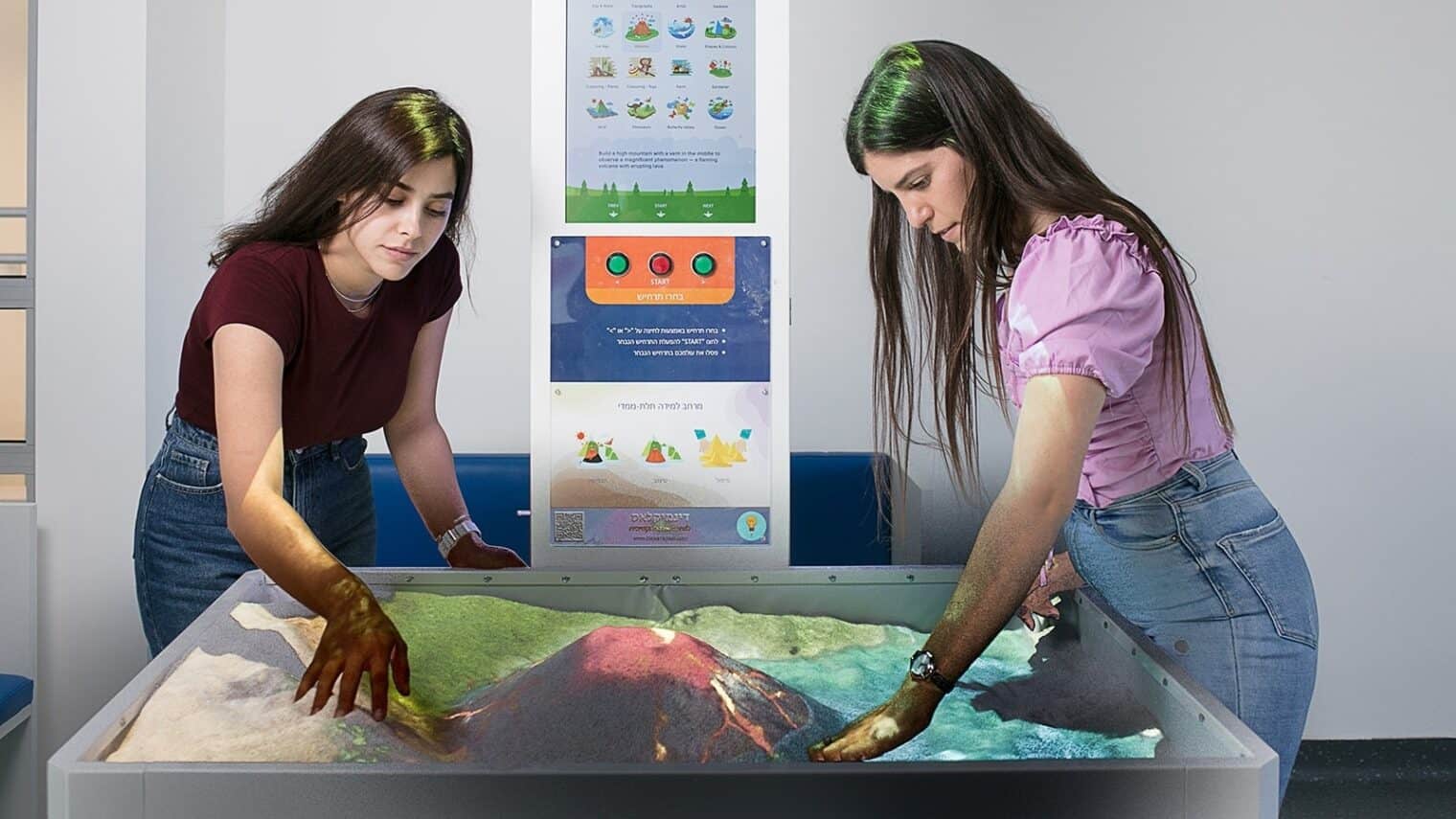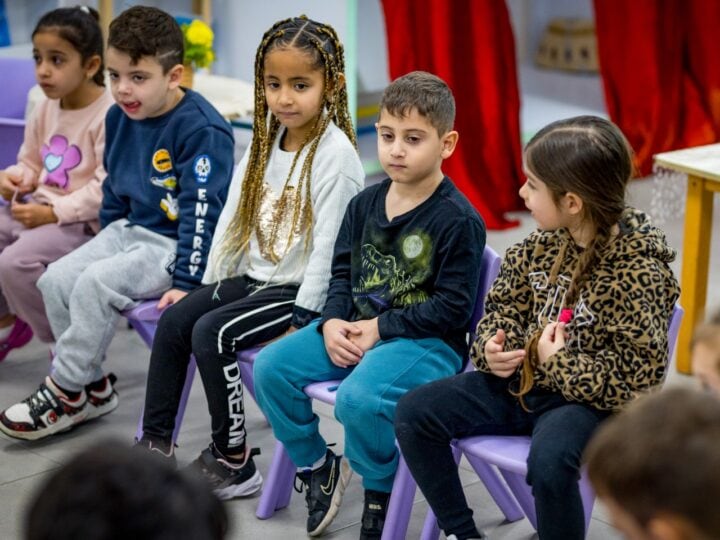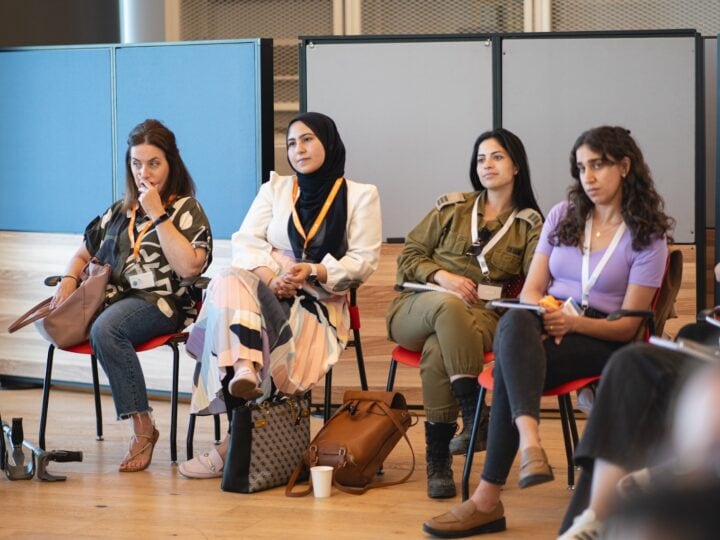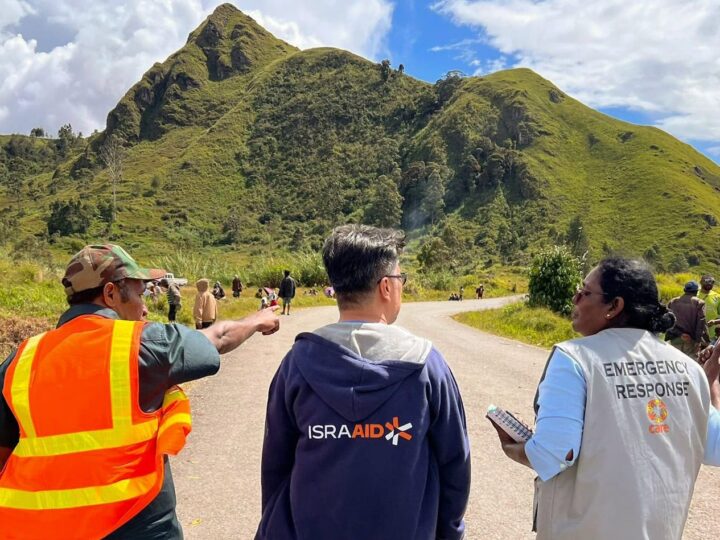When I was in fourth grade, a classmate brought in “X-ray glasses” he’d obviously gotten out of a cereal box. Peering through the plastic lenses, he claimed he could see our teacher’s skeleton. Yeah, right.
But he was only a few decades ahead of his time.
Thanks to the magic of augmented reality, kids can now point a tablet at a special t-shirt won by their teacher to view the location and function of her heart, liver, bones, circulatory system and other organs.
I saw this for myself during a tour of the digitized, gamified innovation centers for teaching and learning at Gordon College of Education in Haifa.
Prof. Rhonda Berger Sofer, director of the college’s International Center, wriggled into the AR-enabled t-shirt and suddenly I was seeing an anatomy lesson my fourth-grade classmate could never have imagined.
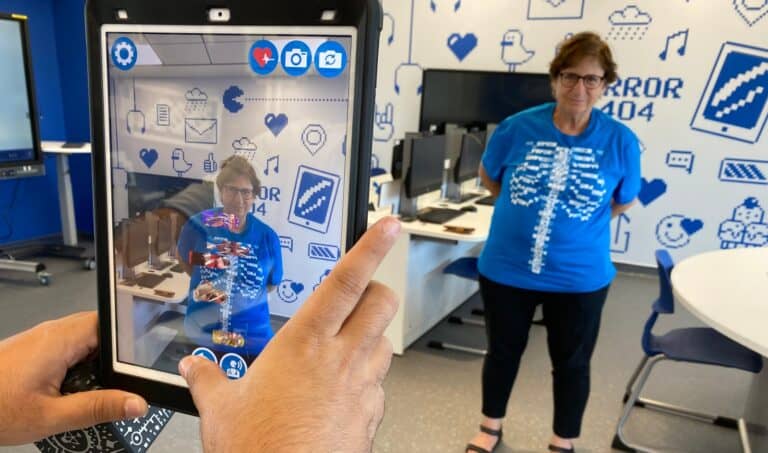
The classroom of yesteryear doesn’t match the needs of instructors or pupils, Sofer says.
“Unfortunately, classrooms haven’t changed for a couple hundred years – the teacher in front, the students sitting in rows of desks. The room you see here is about learning through doing, engaging the students through different senses,” she explains.
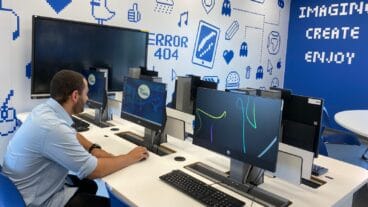
Using the senses
At an interactive sand table, kids can see and feel aspects of geography, topology and climatology — how lava flows in a volcano, how the seasons change.
At a touchscreen table, they can launch puzzles, quizzes and simulations of flying into space, going on safari in Africa, or exploring ancient Rome.
On the floor, they can play virtual math and geography games using their feet.
“Instead of hearing boring facts about earthquakes, you are engaged in a very exciting way and will remember the lessons better,” says Sofer.
“For a kid who doesn’t have the patience to sit still, if he can feel and see and understand he may be motivated to open the textbook.”
Raising the status of teachers
Gordon’s International Center is involved in knowledge exchange, research and joint innovation with many countries, geared to training teachers of the present and future.
“We are experts in digital pedagogy, finding the right technological tools for all ages,” she says.
“You can’t advance the way children learn if you don’t advance the teachers.”
While the center coordinates projects on the strength of the Israeli knack for innovation and creative thinking, Israel also benefits because its own education system requires an upgrade.
Despite Israel’s considerable achievements, a 2021 Shoresh Institution for Socioeconomic Research report revealed that the average level of knowledge of Israeli children and of Israeli education majors is among the lowest in the developed world.
And although Israeli teachers earn slightly more than the OECD average, the number of pupils per class also is higher than the OECD average.
Sofer says improvement hinges on raising the status of teachers in the eyes of the government and society.
“Everything we are doing here helps raise the status of teachers. Changing attitudes takes time, but it has to start by giving teachers a working environment they can enjoy and succeed in,” she says.
“You can’t advance the way children learn if you don’t advance the teachers,” she states.
“You have to be out of the box because the world is changing at such a fast pace. We have to create adults who are empowered to take chances, try new things and be innovative.”
No more chalk and talk
In a digital world, teachers are not primary sources of information, says Sofer.
Instead, they must mentor and guide pupils to find, filter and evaluate oceans of available information.
“It’s no longer chalk and talk,” she says.
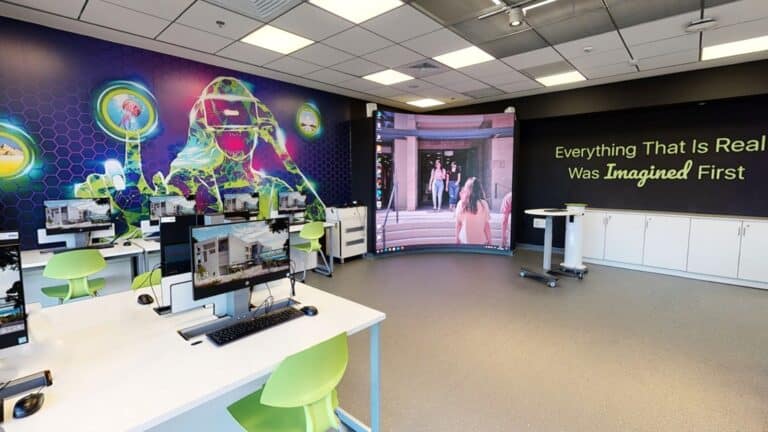
“The role of the teacher today is to empower the learner to be a critical, flexible and creative thinker who knows how to find information, distinguish good information from bad information, and know what questions to ask. If you don’t ask the right questions, you will go down the wrong path.”
In the innovation centers, desks are equipped with computers that can be tucked away with the press of a button to create a flat workspace. The desks are clustered to encourage teamwork and group projects.
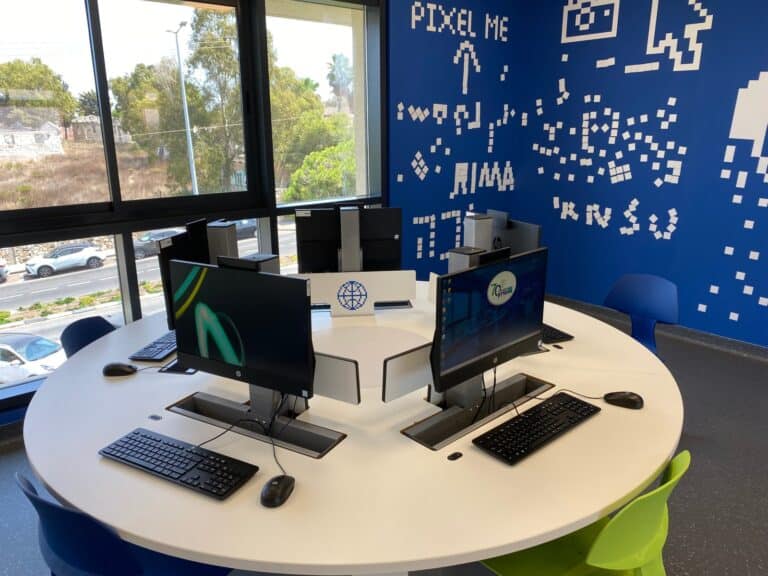
“Even in a big class, you can create learning groups and give each group a mission they are responsible to complete and then teach to others,” says Sofer.
Kids and teachers don’t always sit on chairs. They can sprawl on beanbags or cycle a stationary bike with an attached surface for tablets or laptops.
“If I had that when I was a classroom teacher, I would still be teaching because standing in front of a classroom is not my style,” confides Sofer.
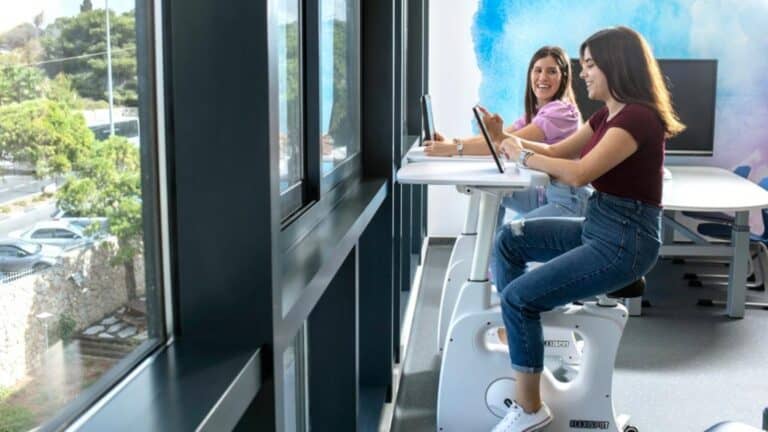
Medical students from the nearby Technion-Israel Institute of Technology come here for group AR and VR explorations presented on giant screens.
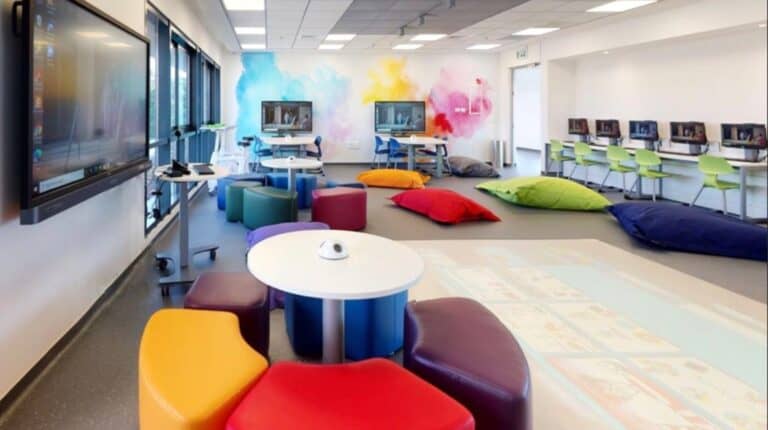
Even the corridors are learning centers for out-of-classroom education. There are app-connected stations for 3D printing and animated moviemaking.
Second-year students put their understanding of educational theory to the test in an escape room.
“If you don’t know the theory, you don’t get out,” quips Sofer.
Partners abroad
One of 22 colleges of education in Israel, Gordon began consulting for a school for children with special needs in Dnipro, Ukraine in 2002, with funding from Combined Jewish Philanthropies of Boston. The relationship continues today, as Sofer’s team guides the staff in helping the families deal with the trauma of war.
“That’s what launched us into contributing our expertise to the world,” says Sofer. “I strongly believe that sharing knowledge with the international community can bring change.”
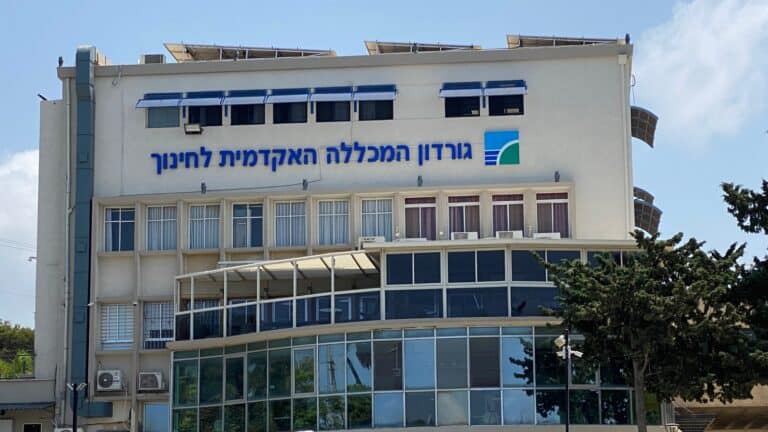
The college has won tenders for World Bank and UNICEF education projects as well as 13 multiyear Erasmus education innovation projects in the European Union.
Among the countries assisted through these projects are Armenia, The Netherlands, Germany, Austria, Romania, Georgia, Turkey, Chile and Morocco. Gordon also has student exchange programs with 18 European universities.
The newest Erasmus project, coordinated by a Greek NGO and the University of Crete with 11 partners including Gordon, is developing a game that teachers, parents and guardians can use with children ages 9 to 11 to counter addiction and cyberbullying.
A recent UNICEF project involved consulting on inclusive and special early-childhood education to the government of Georgia.
“We finished the program in March and they are already piloting it in outlying regions,” says Sofer. “Some of their experts came here and we showed them the mishpachton [Israeli family daycare model] and they fell in love with it. One of the mayors is implementing it now.”
Gordon also is involved in a World Bank project assisting Armenia in establishing a national center for educational development and innovation.
21st century skills
At home in Israel, Gordon personnel design learning environments for Jewish and Arab elementary through junior high schools according to needs expressed by principals.
“Schools have asked us to create classrooms where learning matches the needs of the 21st century,” says Sofer.
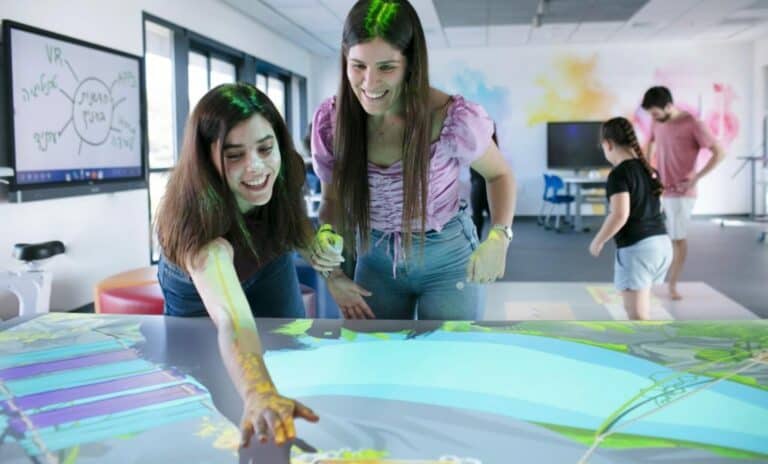
Ongoing teacher training and support is provided by the college’s pedagogical digital consultants.
She says teachers should not feel threatened by new technologies but rather incorporate them.
“I remember when cell phones first came out and my students were playing with them in class, I understood I had to work with this trend rather than fight it,” she says.
“I told them to bring their phones and iPads to class, and instead of just teaching the anthropological theory of education I gave a mission to each group: 15 minutes to investigate a specific segment of the topic and tell us about it. They were much more engaged than if I had told them the information.”
She feels similarly about generative AI tools such as ChatGPT.
“We’ll be making the biggest mistake in education if we don’t relate to the idea of how we can use AI to promote learning rather than being used by it, to control it and understand the good it can bring,” she says.
Generative AI is simply the next step in a progression, she says, just as handwriting was replaced by the typewriter, which was replaced by the word processor.
“People are afraid of it, but ChatGPT can be an adjunct for learning. We’ve set up a committee that’s looking at the ethics of it, because we want to teach our children how to use this tool to become better writers.”
From problem student to PhD
Sofer, now a 71-year-old grandmother, is motivated to help teachers find the strengths of every student because of her own childhood experience in the Boston area.
“I was a problem kid. I had ADHD and I was a poor student. I was yelled at by my teachers,” she recalls.
“All the time, my second-grade teacher told me that I would never get good marks because I did not sit still and pay attention.”
Sofer proved that teacher wrong. She earned a doctorate in sociology and anthropology and became a teacher.
She has been working at Gordon College since 1997 to ensure teachers everywhere can help every child succeed in school.
“I had such a difficult time with my studies,” says Sofer. “If I’d had these opportunities, I would have been empowered and encouraged and been able to use my strengths. The teachers would have been trained to know how to relate to me.”
For more information on Gordon College’s International Center, click here.




